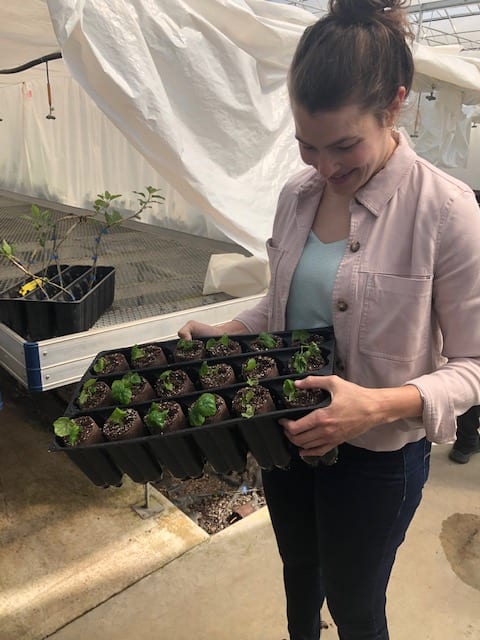The Importance of Clean Vines: Why This Conversation Matters
The health of Canada’s grapevine industry starts at the root—literally. Certified clean vines are the foundation of a strong, sustainable vineyard, yet many growers and nurseries face challenges in maintaining clean planting material. Infected grapevines contribute to delayed maturity, reduced sugars (by at least 4 brix), lower winter hardiness, and on average a 42% yield reduction! Producing wine with infected grapes contributes to reduced alcohol, lighter color, less body, increased acidity and lower black and red fruit character.
Meet the Growers & Facilities Committed to Clean Vines
In this feature, we highlight three nurseries dedicated to producing CGCN-RCCV certified grapevines: Vitis Vines, Viticulture A&M, and Upper Canada Growers, as well as Steve Ells and Steve Mitchell, two experienced grape growers who rely on high-quality, certified vines to support resilient vineyards and consistent fruit quality.

Vitis Vines – Thomas (Tom) Grégoire
Located in the Annapolis Valley of Nova Scotia, Vitis Vines Inc. is a grapevine nursery committed to supplying growers with high-quality, CGCN-RCCV certified vines. With Thomas Grégoire as the President, Vitis Vines has been dedicated to sustainably propagating grape vines through advanced tissue culture techniques since 2012. This innovative approach ensures the production of clean, virus-free vines, crucial for successful cultivation in Canadian climates.
Initially focused on research and development, Vitis Vines began offering their potted grapevines to hobbyists, backyard growers, and enthusiasts. Recognizing a widespread interest in grape cultivation, whether for winemaking, ornamental purposes, or culinary uses, they provide not only high quality vines but also comprehensive guidance on planting, and maintenance.
Learn more: vitisvines.ca/about

Viticulture A&M – Alain Breault
Based in Saint-Paul-Abbotsford, Quebec, Viticulture A&M is operated by Alain Breault, who brings a deep understanding of viticulture and nursery management. The nursery has been a key supplier of CGCN-RCCV verified vines since 2019. Breault plays a hands-on role in ensuring that all propagation practices meet CGCN-RCCV standards, offering grape growers in Eastern Canada access to clean, reliable planting material tailored to their climate and needs.
Learn more: https://www.viticultuream.ca/index.html

Upper Canada Growers – Megan Haynes
Located in Niagara-on-the-Lake and Harrow, Ontario, Upper Canada Growers produces a variety of fruit trees and grapevines, including CGCN-RCCV certified stock. Vice President Megan Haynes manages grapevine production at the nursery, overseeing both propagation and customer relations. Since becoming a CGCN-RCCV registered nursery in 2020, Upper Canada Growers has steadily expanded its grapevine offerings, working closely with the network to meet industry demands for certified and regionally adapted material.
Learn more: https://www.uppercanadagrowers.ca/wholesale
The Perspective from CGCN-RCCV Registered Nurseries
What motivated you and your business to work with CGCN-RCCV?
Megan Haynes: We always wanted to contribute to improve the quality of grapevines. We always focus on making the best product.
Tom Grégoire: As a nursery committed to top-quality grapevines, partnering with CGCN was a natural choice. Their certification ensures our vines are clean, virus-tested, and meet the highest industry standards for long-term vineyard success. With rising disease challenges, reliable plant material is more important than ever. By supporting CGCN, we are helping to strengthen Canada’s viticulture industry and ensure a more resilient future for growers.
Alain Breault: When some growers claimed my vines might have viruses, I had no way to confirm or refuse it. My only argument was that my plants came from recent hybrid crossing, meaning they had little time to become infected. CGCN testing proved me right. Certification provides not just scientific validation but also a guarantee of quality and trust for growers.
How has CGCN’s program improved your business (reputation, competitive position, etc.)? How has it improved the marketability of your products?
Haynes: Getting access to the resources of CGCN helped us significantly enhance the quality of our plant material. Just as importantly, it opened the door to an invaluable network of researchers, growers, nurseries and universities across the country.
Grégoire: Growers are actively seeking CGCN-certified vines, recognizing them as a mark of reliability. Certification has made our products more marketable by assuring buyers they are investing in clean, disease-tested plants that support long-term vineyard success. The demand for high-quality vines continues to rise, and we are proud to be at the forefront, providing growers with the best possible foundation.
Breault: The vast majority of my winegrowing customers are not concerned about viruses, unlike winemakers who have suffered losses due to the presence of viruses in their vines. Because of the subsidies for planting certified seedlings, it allowed me to sell a lot of certified seedlings.
What have you learned from following CGCN’s program?
Grégoire: The process has reinforced the importance of rigorous testing, documentation, and traceability in maintaining clean plant material. We’ve also gained a deeper understanding of how certified vines can contribute to the broader industry by preventing the spread of disease, protecting investments, and improving overall vineyard longevity.
Breault: The fact that my mother vines are currently [virus-tested] is very reassuring.
How has being a part of the CGCN-RCCV Clean Plant Network helped you connect with other growers and industry leaders?
Haynes: Thanks to CGCN advertising our nursery to the growers, we were able to extend our network all over Canada. It’s created opportunities to exchange knowledge, experiences, and best practices, particularly around disease management and the benefits of clean plant material. Through this network, we’ve been able to build relationships based on trust and a shared goal of improving the overall quality of Canadian vineyards.
Grégoire: Joining the CGCN network has connected us with nurseries, researchers, and growers across Canada. These relationships allow us to stay informed on best practices, industry challenges, and emerging innovations. Being part of this community has strengthened our position as a trusted source of clean plant material and allowed us to contribute to important conversations shaping the future of Canadian viticulture.
Breault: The program certainly gives my company credibility with people in the industry.
What would you say to growers who are considering purchasing CGCN-RCCV vines, despite the higher cost due to rigorous virus testing protocols?
Haynes: We always tell growers that while CGCN-certified vines may come at a higher upfront cost, they are a smart long-term investment. The rigorous virus testing and certification protocols significantly reduce the risk of introducing harmful diseases into your vineyard. That means stronger vines, better yields, and fewer losses over time. Starting with clean material sets your vineyard up for long-term success, it’s not just about the first season, it’s about the future of your entire operation.

Grégoire: Planting CGCN-certified vines is an investment in vineyard longevity. While the initial cost may be higher, the savings over time—through reduced virus-related losses and improved vine productivity—far outweigh the upfront expense. More and more growers are recognizing the value of clean stock and making the shift toward certified material to future-proof their vineyards.
Grower Spotlights
Steve Ells, based in the Annapolis Valley of Nova Scotia, has been growing grapes for over 30 years. With more than 50 acres under vine, he cultivates a range of premium hybrid and vinifera varieties such as chardonnay and pinot noir. For Ells, planting certified clean vines has contributed to healthier vineyard establishment and better disease resistance, translating into more consistent fruit quality year after year.
Steve Mitchell operates a family-run vineyard and winery called Spruce wood Shores Estate located in Lake Erie North Shore, Ontario, where he’s grown Cabernet Franc, Cabernet Sauvignon, Baco Noir, Petit Pearl, and Marquett for over two decades. Mitchell emphasizes the long-term value of starting with certified clean vines, noting how they’ve enhanced vineyard resilience and reduced the risk of virus-related setbacks. His commitment to clean plant material supports the overall sustainability and productivity of his operation.
Learn more: https://www.sprucewoodshores.com/our-story/
The Perspective from Veteran Grape Growers
What motivated you to work with a CGCN registered nursery and purchase CGCN-RCCV vines?
Steve Ells: As a commercial grower I can’t allow myself to have unclean vines. It is impossible to have a healthy business if you spend your time and money with unclean vines.
How does planting CGCN-RCCV vines enhance the reputation and the marketability of your grapes?
Steve Mitchell: Planting certified vines will give a clean starting point for a virus free future. Viruses can be economically devastating and if wine production is maintained with these vines, they will reduce the quality of your product and tarnish your brand.
If you could go back in time, what would you tell yourself/would you change anything about your vine production?
Ells: Slow down and don’t be in the hurry. Make sure your vines are clean and to have the right variety.
Mitchell: Grow cold hardy varieties and avoid the weaker [ones]! Regularly test for diseases! Get certified grape stock! (If only it was available then). Ensure the starting years are successful for the vines.
What would you say to growers planning to start a new vineyard?
Ells: You have to take your time. You don’t have to plant all of your vineyards in a year.
Mitchell: Be wary, vineyards can cost a lot of money and you are planting for the next 20 years of sales. Be sure of the vines you select and manage your vineyard carefully.
As a grower, your relationship with your preferred nursery is vital to the success of your vineyard. What would you say to nurseries to express the importance of producing clean grapevines?
Ells: If you don’t, I won’t buy your vines.
Mitchell: We had to rip out 28 acres of vineyard because of Leaf Roll disease! Once a problem gets started it can be difficult to resolve. Start with clean material to avoid future issues that can be very costly.
Conclusion: Strengthening Canada’s Viticulture with Clean Vines
The future of Canada’s grape and wine industry depends on the health of its vines. As we’ve heard from both nurseries and growers, certified clean vines provide undeniable benefits, from improved fruit quality to long-term vineyard sustainability. By continuing to support clean plant material programs and certification efforts, we can help ensure a resilient, thriving viticulture industry for generations to come.
To learn more about certified clean vines, visit our Clean Vines FAQ sheet.
Nurseries interested in participating in our programming can explore our Certification Pages, and growers can also encourage their preferred nurseries to reach out and get involved using our Contact Us page.
